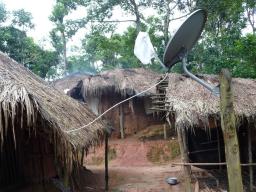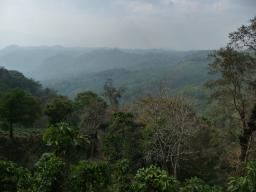“Dependency” has long been described by welfare and development workers as one of the central problems of the indigenous (Adivasi) communities of the Nilgiri hills in South India. The discourse of development constructs dependency as a negative marker of social failure and perceives self-sufficiency and self-reliance as essential steps in bringing populations into freedom and full membership in ‘modern society’. Categorised as dependent (on state rations, loans and external support), aid beneficiaries are often portrayed as inferior, weak and passive as opposed to the active, healthy, independent donors. This construction of dependency shapes the work of local development agents, who promote Individual money-earning as a key practice for self-elevation and aim to gradually withdraw their own presence from the hamlets to prevent long-term dependency.
By focusing on a community of people officially called Nayaka, I offer a different perspective on the derogatory notion of dependency and the idealisation of self-sufficiency. I show how different constructions of those concepts affect how the different actors view themselves, their counterparts in development projects, and the projects themselves. The words of the Nayaka people I work with describe projects not as steps towards self-sufficiency but as part of mutual and long term caring-relations. What might be seen as a top-down power relation is re-narrated into a multi-directional one, in which Nayaka are not passive but active, virtuous, and helpful actors and developers are criticized for actively neglecting their social duties. Such discourse not only reduces the appeal of social independence as a desired goal but also challenges the common representation of Nayaka history. Last, my work helps clarifying why, despite the communities desire to cooperate with projects and welcome developers who come to their hamlets, in the long term, both sides express great frustration at the results of projects and the relationships with their partners.
Speaker
Noa’s study focuses on Nayaka people living in the forested hills of South India. She studies local senses of family life, childhood, learning and knowledge, in the contemporary context of significant changes in people’s lives and environment (e.g., development intervention, deforestation, etc.). Among other things, she explores the central role of people’s unmediated relations with the (social and physical) environment in the construction of their unique notion of knowledge and personhood.
She is also a co-founder and co-director of the Forager Child Interdisciplinary Research Group, which aims to understand the pasts, presents and futures of hunter-gatherer children’s learning (foragerchildstudies.wordpress.com).
Location
Speakers
- Noa Lavi
Event Series
Contact
- Fouzieyha Towghi
Image Gallery
File attachments
| Attachment | Size |
|---|---|
| Developing_Relations-Noa-v1.1i.pdf(385.87 KB) | 385.87 KB |

